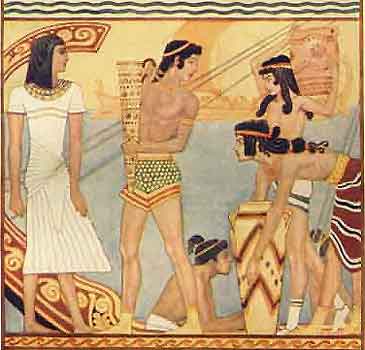
"What did Homer teach? In the first place, he taught the Greek language. His immortal works helped to standardize that language, or rather to lift it up to that level of excellence and dignity which can be reached only by means of literary masterpieces. His writings became for the Greek people a kind of Bible, to which they were always ready to listen and which gave them and their children patterns of honor, of good breeding, and of good language. In spite of its mythological contents, the Bible was a lay Bible; that is, there was nothing sacerdotal in it, and it was remarkably free of magic and superstitions. The Ionian poet was truly an ancestor of the Ionian scientists whose achievements will be explained later. In the second place, the Iliad and the Odyssey taught history, the history of the Minoan and Mycenaean origins, which were in some respects dim and distant, yet in other respects near enough in the form of tools, usages, words, and folklore to be easily recognized and understood by the listeners. It is the very function of epic poetry to record the past for posterity and prevent it's oblivion."
"Homeric poetry offers us a mirror of the Mycenaean age, which was then vanishing, yet was vividly and joyfully remembered by the old people and the minstrels. Like every epic, it was turned toward the past; it is thus a little paradoxical to call it the harbinger of a new age. It is a climax or an ending rather than a beginning yet it proivided the new people, the Greeks, with a solid foundation upon which to establish a new culture; it provided them with a standard of propriety and a guide of conduct; it gave them pride and dignity. To put it otherwise, I am more and more convinced that the Greek culture of Homeric days was not something radically new but rather a sec ond growth of the Aegean culture which had been completely destroyed, however; consider, for example the rich growth of plants in a region devastated by volcanic eruptions or desiccated by a long drought. One might think that everything is dead, but it is not. Life is dormant and may remain so for a long time, yet let the blessed rain fall and the mercy of heaven permit it, and it will soon reappear as vigorous as ever. Much is lost in the process, of course, and new elements are mixed with the old ones. The new Greek culture was a revival of the old one; that revival was deliberate, at least from the point of view of the minstrels and their patrons. It was different in many respects from the Aegean one, for the conditions of life were deeply modified. For one thing this was the age of iron; the days of bronze could never come back."














6 comments:
How did the Aleph Bet become the Alpha Beta or vice versa? Who stole from whom? Dan or Judah? Why write in different directions?
Was this a result of the Tower of Babel? I have suggested this was a result of a deafening catastrophe, say Thira/Thera and as a result, passing on spoken language is very difficult as those who know it are deaf and those who are not deaf are hearing many garbled sounds.
I know that Irish Gaelic was standardized last century, 50 years ago, in written form, using the Latin Alphabet. Up until then it had its own form of letters. The Homeric achievement was good, but when? Troy fell 1200 or so BC? The survivors Aeneas, show up in Etruria, 700 BC. Did their arrival mean a renewed interest in Troy and where they had come from? Once things had settled down after Thira, the arts are eventually prioritised?
Where have you been? It's been quite a while since your last post. I can't just find antiquity/abiotic commentary just anywhere! LOL
OIM,
Why no more posts?
I was living off-grid with no internet. Just shipped all my books from New York, intending to begin writing book on History of Expansion Tectonics.
It is a very interesting idea. The paradigm of Plate Tectonics is certainly obsolete, especially when discussing the so-called subduction. Current studies on the physical characteristics of Earth's mantle seems not to allow that there is subduction of plates. Expasion Tectonics has been and still is an appropriate way to understand the dynamics of our planet. Congratulations for the initiative.
Keep sharing such ideas in the future as well. This was actually what I was looking for, and I am glad to came here! Thanks for sharing the such information with us.
Extenze Reviews
Post a Comment